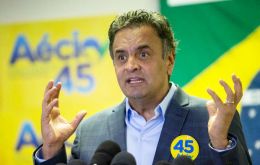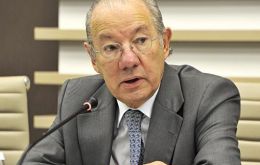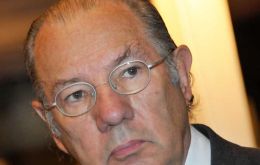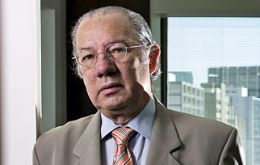MercoPress. South Atlantic News Agency
Tag: Rubens Barbosa
-
Saturday, July 21st 2018 - 07:43 UTC
Capital flight from emerging economies will be on the G20 table, anticipate Brazilian sources

At this weekend's G20 meeting in Buenos Aires, finance ministers and central bankers will address the economic situations threatening a number of emerging markets -- including host nation Argentina, which recently secured a US$50 billion IMF loan to try to stabilize its economy, after the peso plunged 35% between April and June.
-
Monday, October 13th 2014 - 00:20 UTC
Neves pledges a deep reform of Mercosur and opening to the world, if he wins

Deep reforms and opening Mercosur to the world will be proposed by opposition candidate Aecio Neves to the other full members, if finally he is elected to lead Brazil in the 26 October runoff against president Dilma Rousseff, said Rubens Barbosa a trade expert, former ambassador in the US and currently coordinator of the opposition government program.
-
Wednesday, January 29th 2014 - 22:38 UTC
Brazil can't be hostage of Argentina or Venezuela in Mercosur/EU trade negotiations

The Brazilian government is determined to advance with negotiations for a trade agreement between Mercosur and the European Union even if it means leaving Argentina for a second phase of the process, according to sources from Itamaraty, the country's foreign ministry, reported in the Rio do Janeiro media.
-
Thursday, September 26th 2013 - 06:01 UTC
Brazil’s main manufacturing lobby calls for urgent resumption of trade talks with EU

The powerful manufacturers lobby, Sao Paulo’s Industry Federation, Fiesp believes a free trade agreement between Mercosur and the European Union is very much needed so that Latam’s largest economy climbs out from the “commercial isolation” in which it currently stands.
-
Monday, July 2nd 2012 - 01:00 UTC
“Argentina will be responsible for the end of Mercosur” claims top Brazilian businessman

Brazilian businessman Rubens Barbosa, head of the foreign trade council of the Sao Paolo Federation of businessmen said on Sunday that in the last six months, the Argentine presidency of the bloc implemented measures that practically killed the Mercosur.
“Argentina will be responsible for the end of Mercosur,” he predicted.
